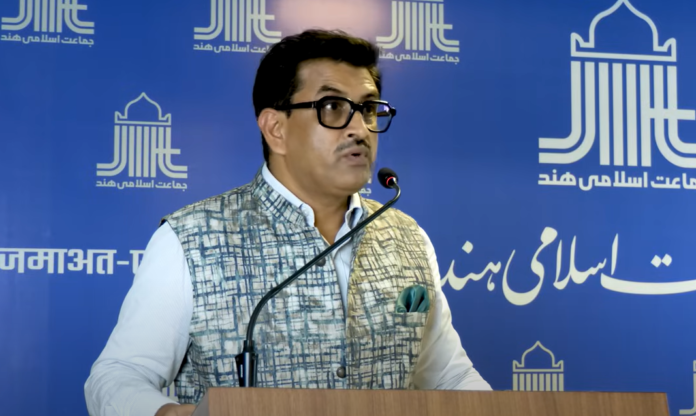India Tomorrow
NEW DELHI: Senior Supreme Court lawyer and a member of the All India Muslim Personal Law Board (AIMPLB) M R Shamshad has said that the Waqf Amendment Bill 2024, officially titled the Unified Waqf Management Empowerment Efficiency and Development Act 2024, represents a significant encroachment on the management and ownership of Waqf properties.
Mr. Shamshad was speaking at a programme at the Jamaat-e-Islami Hind headquarters on the issue of the proposed amendments in the Waqf Act 1995.
He spoke in detail on the perceived threats the Bill poses to Islamic religious endowments, including mosques, madrassas, and other Waqf properties, and the broader implications for the Muslim community.
He criticized the bill for its approach, which he claims unjustly consolidates control over these assets under government authority.
The government has cited three main reasons for introducing the bill: addressing alleged mismanagement within Waqf boards, alleviating Muslim poverty, and correcting perceived legal issues associated with the existing Waqf Act. Advocate Shamshad, however, dismissed these justifications as unfounded and misleading.
1. Alleged Mismanagement: Shamshad contended that the bill’s provisions, which include new oversight mechanisms and administrative changes, do not effectively address genuine issues of mismanagement. Instead, he argued that they undermine the community’s control over its own properties.
2. Poverty Alleviation: He questioned the logic behind removing community management of Waqf properties in the name of poverty alleviation. Shamshad asserted that the bill does not address the root causes of poverty and instead places undue restrictions on the management of Waqf assets.
3.Legal Corrections: The advocate criticized the government’s claim that the existing Waqf Act negatively impacts the legal system. He argued that the bill’s proposed changes, including the introduction of a new tribunal system with limited appeal options, could lead to protracted legal battles and further marginalize Waqf boards.
Particular concern about several aspects of the bill
Centralized Control: The bill proposes significant changes in the governance of Waqf properties, including increased representation of non-Muslim members in the Central Waqf Council, which supervises state Waqf boards. Shamshad highlighted that the bill reduces the number of Muslim members on the Council and introduces provisions for non-Muslim appointments, which he argues undermines the community’s influence over its own religious endowments.
New Deed Requirements: The bill introduces stringent requirements for declaring properties as Waqf. Previously, oral declarations sufficed for creating Waqf properties, but the new bill mandates formal deeds and government approval. Shamshad argued that this change imposes unnecessary bureaucratic hurdles and diminishes the role of Waqf boards.
Excessive Government Control: Shamshad warned that the bill gives excessive control to government officials over Waqf properties. This control, he argued, could be used to sideline community interests and undermine religious freedoms.
Shamshad challenged the narrative surrounding Waqf properties and the supposed need for reform. He criticized the widespread misinformation that portrays Waqf institutions as engaged in land grabbing and misuse. According to Shamshad, the statistics cited about the number of Waqf properties are misleading, as they do not differentiate between various types of properties such as mosques, cemeteries, and educational institutions.
He also refuted claims that Waqf boards have excessive powers or engage in unlawful practices. Shamshad emphasized that the process of declaring a property as Waqf involves thorough scrutiny, including land review records, documentation, and survey reports, followed by a gazette notification. The portrayal of Waqf boards as unregulated entities, he argued, is a distortion of the facts.
Advocate Shamshad raised concerns that the Waqf Amendment Bill 2024 could have far-reaching consequences for the Muslim community. He argued that the bill undermines the constitutional protections afforded to religious minorities under Articles 25 and 26 of the Indian Constitution. Article 25 guarantees individuals the right to declare property as Waqf, while Article 26 ensures that religious groups have the right to manage their own affairs.
Shamshad warned that the bill’s approach could effectively strip the Muslim community of its fundamental rights over Waqf properties. He criticized the bill for creating bureaucratic obstacles to the declaration and management of Waqf assets and for diminishing the role of Waqf boards in favor of government control.
In his presidential address, JIH Vice President Prof. Salim Engineer expressed concern that the current government, which he described as an ideological group rather than a mere political party, is targeting Muslim religious institutions and Waqf properties. He welcomed the bill’s referral to a joint parliamentary committee, viewing it as an opportunity to raise objections and present suggestions.
JIH Assistant Secretary Inamurrahman echoed these sentiments, criticizing the negative propaganda against Waqf properties. He argued that the government’s efforts to undermine the Waqf Act and the introduction of the new bill are part of a broader strategy to seize control of valuable Waqf lands. He pointed out that the first Waqf Act was enacted during British rule in 1923, countering the notion that it was a recent political manoeuver.
The Waqf Amendment Bill 2024 has sparked widespread debate within the Muslim community and beyond. As the bill progresses through parliamentary scrutiny, it remains to be seen how these concerns will be addressed and whether amendments will be made to ensure that the rights and interests of the Muslim community are adequately protected.





